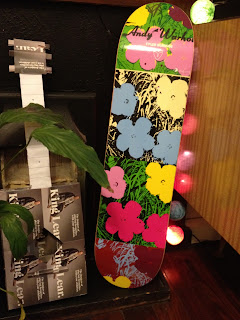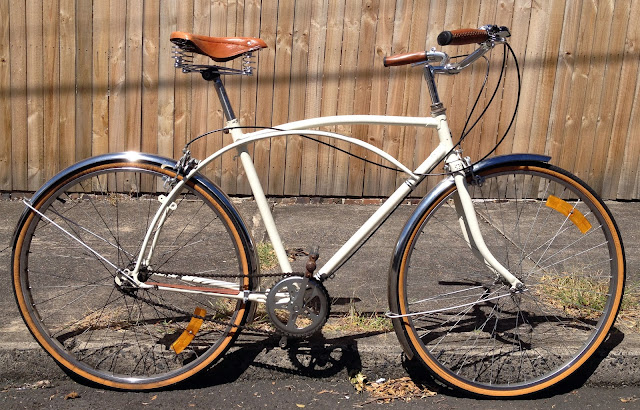I love skateboards, probably because they were so rare when I first started skating. My pre-teenage life in the small Scottish town of Carnoustie didn't offer much opportunity to visit skate shops, but I could get skate magazines and would spend hours intensely scrutinizing the products, particularly the decks. I would ascribe them characteristics relative to my own skateboarding ability, and convince myself that a certain board would help me skate in a certain way. This is true, but in my mind the link between my board and my own capability remains ridiculously exaggerated.
I was obsessed with the boards of other skaters. I was fascinated by the inscrutable griptape graffiti on the decks of the older guys I'd see in Dundee: Factory Sensibles; DEVO; ELVIS LIVES arranged in a Dogtown-style cross. What did it all mean? My 12-year-old mind did not know, but I loved it all anyway.
Cease and Desist (C&D) is a company that reproduces classic skateboard decks from the late 1980s/early 90s in limited runs. They've reissued a lot of the SMA World Industries and Blind decks from around this time, many of which have graphics by Marc McKee. These decks are so evocative of that era and all that was exciting about it: the move towards double-kick boards as street skating started to realise its potential; the unique shape of every professional skateboarder's pro-model deck, redolent of their skating style; the exclusivity of skating, which was then an entirely niche subculture far removed from the sportified athletic activity it has been wrenched into today. Most of all, it reminds me of a time I was completely wrapped up in skating, when I could learn a new trick every day and ollie so high that my knees would smash into my face.
 |
| Some of Marc McKee's graphics for Blind and World Industries in the early 90s |
* * *
I recently bought a C&D reissue of the 1990 SMA World Industries Ron Chatman 'Ron Chatman Experience' deck. I will not skate it; it is to hang upon my wall. The graphic is a pastiche of the Jimi Hendrix Experience 'Axis Bold as Love' album art. I remember boards of this era being coated in a heavy gloss lacquer-varnish that is absent here, but it's otherwise an accurate reproduction. Importantly the hue of the woodstain seems authentic to the era. There is something potent in the contrast of the fluorescent screen-printed cartoonish graphic screaming off the stained wood background. I love this effect, and wish it was more prevalent in skateboards today. I hated it when boards went to full-cover graphics - there must be an economic or practical reason for this, as it is aesthetically inferior.
 |
| Cease & Desist 2011 Reissue of the 1990 SMA Ron Chatman 'Ron Chatman Experience' deck |
Ron Chatman came to Scotland with John Cardiel, Alan Peterson, The Gonz and Salman Agah in 1992. I went to see them skate at Livingston skatepark. I got so hyped watching the skating that I wanted to skate as well, so I left the crowded skatepark to go roll around a nearby carpark. Some of the visiting pros wanted to escape the park as well, because Alan Peterson and Salman Agah showed up and skated with me. I had an H-Street Dan Peterka deck. Salman Agah skated it and said it felt weird, which was a bit of a diss, but I was stoked anyway.
* * *
I still love skateboard decks, and have only just gotten over leaning boards against my bedroom wall in sight of my bed so that they are the last thing I see before I go to sleep (sentimental in my middle years, I now prefer to see my wife). I remain very particular about the decks I skate and I bloody love a nice graphic, which is why I bought one of Alien Workshop's recent Andy Warhol series of decks, a Tyler Bledsoe pro model. I sat it by my fireplace until I was ready to set it up and skate it, but when that time came I decided that I like looking at it so much that I'm now loath to skate it. So I bought another board and it remains by my fireplace, unskated, where I think it will stay. It looks nice, yes?
 |
| Alien Workshop Tyler Bledsoe from Andy Warhol series |










